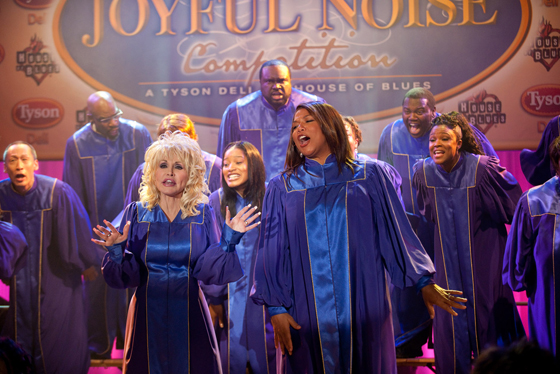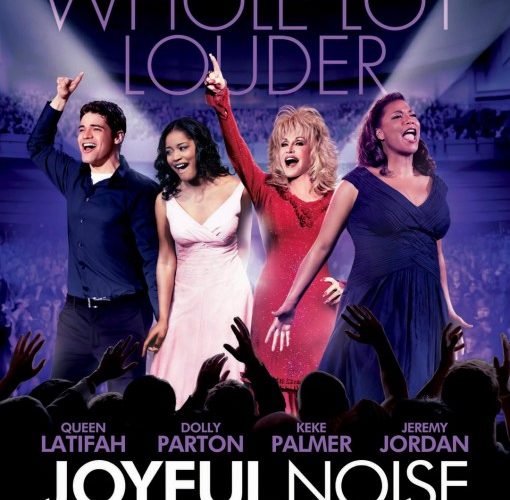
For a film about a gospel choir and the push and pull of faith within its singers’ lives, Joyful Noise has a funny way of getting its message of love and hope across. I understand it’s 2012 and we must show a progressive slant on the church in order to reach audiences and not turn a majority away before the theatre lights dim, but some of the stuff happening in this film is borderline offensive as it panders to the lowest common denominator in its clumsy quest to inspire. Hot-button topics like Asperger’s and military service are hijacked in service of yelling at God for his lack of compassion while a plethora of heavy-handed, holier-than-thou morality quips are injected into the script. It appears as though the actors are reading quotes from a badly written sermon on cue cards just off screen.
Tagged ‘Dream Louder’, its entire main plotline’s titular gospel competition is removed for a majority of the film in order to focus on petty quarrels and self-righteous brats. The initial death choir leader Bernard (Kris Kristofferson) starts everything by pitting his conducting heir Vi Rose Hill (Queen Latifah) against his widow G.G. (Dolly Parton). Their feud is fueled by monetary and creative differences, but really the fight exists so writer/director Todd Graff can piece together a Montague/Capulet type romance between a daughter of the church’s oppressive rhetoric and a son of its forgiving nature. Culminating in a catfight of epic proportions inside a Dennys-like dining room, their interactions are so over-the-top and off-puttingly stupid that you can’t grab hold of anything to achieve balance.
If we’re to rally behind anything in this hamfisted film it should be burgeoning love between Olivia Hill’s (Keke Palmer) conservatively raised good girl and Randy Garrity’s (Jeremy Jordan) heart of gold masked by an excess of obnoxious confidence. But when she tries to do right by mother Vi Rose and not give in to sin, his response is a leading “you’re so much more than that”. He’s basically saying throw your ideals away and passionately kiss me on my grandmother’s kitchen counter because, “you’re fine!” Now there’s a good message for young sixteen-year old girls out there—throw away your scruples for sex. I’m no prude but this whole sequence could have been handled much better. Let the headstrong woman find a compromise in her life, don’t throw her to the bad boy and subvert the whole purpose of the film.
What is the purpose anyway? I really don’t know. I even tried looking past the odd editing, awkward passing of time, omission of events you’d think were important—the choir’s losing performance at the National Semifinals for instance—and schizophrenic meanderings off the championship path whenever the filmmakers wanted to add bad comic relief like a man dying after sex. I hoped at least the music would stand for something, but it only exemplifies today’s youth’s lack of tradition. When did gospel choirs become rock concerts? But, like the audiences in the movie sitting quietly bored until a pastor channels James Brown while back-up singers do all the work, my fellow screening attendees clamored for easy jokes, sex appeal, and backwoods country humor in lieu of good storytelling. Why make good art when it’s cheap thrills and spoon-fed entertainment they desire?

I feel bad the only scene to inspire was a full dressing down of her spoiled rotten daughter by Latifah. Up until this point I began thinking the whole endeavor would continue to cop-out by applauding rebellious children and punishing the adults breaking their backs to give them a life worth living. But when Palmer’s Olivia lets Satan out to curse and sass her mother, Vi Rose erupts in a whirlwind of authoritarian control. It is literally the only honest moment of a movie rife with fabricated sentimentality and misguided lessons. There are too many scenes of Latifah chastising Palmer and setting down rules to drive a wedge between the girl and her boyfriend cutting directly the church showing all three standing together devoid of animosity. Consistency is in short supply.
I’ve never seen Camp or Bandslam so I don’t know whether this is a singular blemish on an otherwise promising directing career for Graff—who I loved as Lou in Opportunity Knocks opposite Dana Carvey back in 1990—but I wonder if he should stick to straight comedy. Characters like Angela Grovey‘s Earla and Andy Karl‘s Caleb infuse a streak of zany fun to counter Courtney B. Vance‘s old school seriousness as Pastor Dale, but it’s as though they belong in a different film. Watching Grovey and Francis Jue‘s Mr. Hsu lustfully embrace with cartoonish theatricality directly after witnessing a touching moment between Palmer and Jordan with them is bewildering. The film’s all over the place tonally and always emphasizes the wrong things as characters become pawns in a sprawling story we care nothing about.
The players too have no depth with Paul Woolfolk‘s Manny written only so Dexter Darden‘s Autistic Walter can ‘feel like a man’ punching him; Jesse L. Martin‘s Marcus turns the valor of military service into a deadbeat Dad’s escape; and Darden himself slips in and out of his handicap when suits the script’s need for tear-jerking moments that sadly come off as laughable. As such, the acting besides Martin—who doesn’t even get to sing considering he’s more accomplished than most involved—and Latifah is overly broad and lacking. Unsurprising considering the cast’s Broadway background, it’s simply one more problem in a film chock full of them. But at least Dolly got to show off her impossibly small waist and physics-defying chest in a fitted choir gown because if I learned anything here it’s that sex sells and churches have bills to pay.
Joyful Noise is in wide release starting Friday, January 13th.

